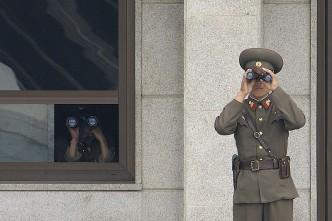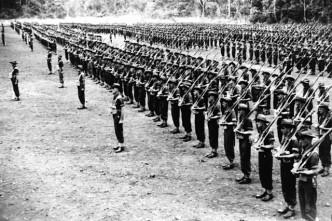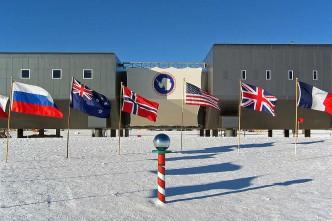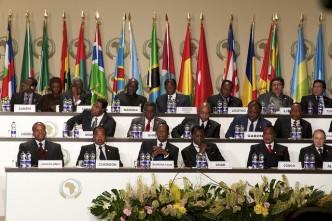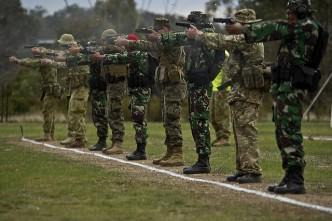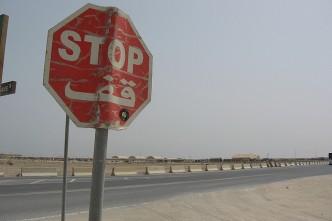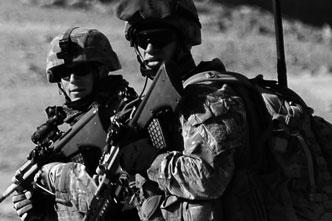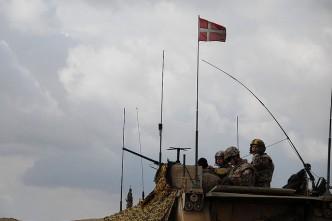As a budget, a White Paper and an election crowd the calendar, Defence counts down the days to the withdrawal from Afghanistan. It’s easier for the Defence Minister to talk about Afghanistan than to say …
As Graeme Dobell’s account of Defence Minister Stephen Smith’s speech suggests, there was scepticism in the audience about his claim that the defence budget over the past twelve years averaged out at a little over …
Recent posts by Tanya Ogilvie-White, Ron Huisken, and Rod Lyon provide stimulating perspectives on North Korea’s evolving strategy and international responses to it. The lion’s share of recent commentary on North Korea has tended to …
I spent September 1984 sleeping in German forests and barnyards. It was Exercise Lionheart and my regiment, the Royal Yeomanry, was providing rear area security for the British Army of the Rhine. Perhaps unsurprisingly, the …
In Peter Layton’s recent post Australia’s many ‘maritime strategies’ he noted that: [A] maritime strategy of land force expeditionary warfare across the Indonesian archipelago… sounds somewhat reminiscent of the last days of WWII, when Australia …
Guest editor Anthony Bergin The Antarctic Treaty is a successful and effective international instrument, providing a stable framework for over half a century of collaborative governance. It provides a means for geopolitical interests to be …
In the world of strategic affairs, competition is almost always a bad thing. Be it jostling over territory, contesting freedom of navigation or an outright arms race, strategic competition tends to be both costly and …
Today, ASPI released my report ‘Planning the unthinkable war: ‘AirSea Battle’ and its implications for Australia’ [view our interview with Ben Schreer on his paper here]. When China’s military modernisation hit its stride over the last …
While Julia Gillard was preparing for her high-profile visit to China, less noticed by the Australian media was a visit to the United States from 1 to 4 April by Singaporean Prime Minister Lee Hsien …
First up Captain Henry J. Hendrix argues in this paper from CNAS that aircraft carriers may be too vulnerable to play the central role in future conflicts that they have played in the past. We …
African security issues are likely to account for a large proportion of Australia’s work on the Security Council and beyond Australia’s two year term, it must be recognized that a more secure Africa is in …
Margaret Thatcher sent me to cover a war, she showed me how leaders do diplomatic knife fights at the summit and she gave me a front row seat as she bruised and bent Britain in …
This year will mark 25 years since then Australian Foreign Minister Gareth Evans delivered a landmark address (PDF) to an Australia–Indonesia business group in Bali, in which he first raised the importance of ‘building ballast’ into …
Guest editor Anthony Bergin Here’s Australia’s Antarctic scorecard: We claim 42% of Antarctica – an area roughly the size of Australia minus Queensland We’ve been there for over a century, and one of Antarctica’s greatest …
This week’s graph isn’t news in its own right. Moore’s Law—which exists in various formulations—concerns the rate of increase in computer performance. It’s well known and has been around for almost fifty years now. But …
This is a shortened version of a longer paper presented to the Alliance 21 meeting in Washington. Abridgment by Kristy Bryden. Islamist extremism—sometimes also referred to as radical Islamism or jihadism—motivates a diverse global movement that has …
Based on previous Defence white papers, this year’s white paper will, among other things, address the question of how the Australian Defence Organisation (ADO) should support Australian civil authorities in peacetime. Areas where the ADO’s responsibilities …
When Prime Minister Gillard announced the National Security Strategy in January this year, she said: ‘national security is the most fundamental task of government’. Indeed Section 51 of the Constitution provides the Commonwealth with powers …
Ross Terrill’s life course and professional experience mirror much of what has happened in Australian geopolitics and economic life since WWII. The country lad growing up in Gippsland started with the ‘umbilical cord’ view of …
Tanya Ogilvie-White’s recent article is a thoughtful and sensible piece that sparked two thoughts. First, the proposition that Chinese and US interests in respect of the DPRK are beginning to align means, I believe, that …


